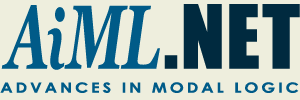AiML start-up document
Modal Logic, originally conceived as the logic of necessity and possibility, has developed into a powerful mathematical discipline that deals with (restricted) description languages for talking about various kinds of relational structures.
Advances in Modal Logic is an initiative to start a bi-annual book and workshop series in Modal Logic. The aim of the book series is to report on important new developments in pure and applied modal logic in the form of overview papers, technical papers and an extensive editorial introduction. The book series is to be complemented by a workshop series from which the contributions to the volumes in the book series will be taken; the aim is to organize these workshops at varying locations throughout the world.
Advances in Modal Logic is an initiative by
- Maarten de Rijke (University of Warwick),
- Heinrich Wansing (University of Leipzig), and
- Michael Zakharyaschev (Freie Universitaet, Berlin).
Background
Over the past few years Modal Logic has expanded rapidly, with new application areas emerging in Computer Science and Cognitive Science, Linguistics, and Philosophy, while considerable advances are being achieved on the theoretical aspects of the field. Notably,
- Modal Logic has been applied to encode grammar formalisms, (see the recent special issue of the Journal of Logic, Language and Information on Static and Dynamic Aspects of Syntactic Structures);
- Modal correspondence theory has been used as a vehicle for automated theorem proving, and extensions of standard proof-theoretic formalisms (like hyper-sequents, display logic, and labelled deduction) have been applied to Modal Logic;
- Modal Logic has been used to study decidable fragments of first-order logic;
- Substantial new results have been obtained in abstract modal model theory;
- Several techniques of combining modal logics have been investigated (see forthcoming special issues of Studia Logica, and the Notre Dame Journal of Formal Logic);
- Extended modal formalisms have been developed in order to obtain descriptively more adequate systems of dynamic action logic, and various approaches to bridging the gap between the theory of belief revision and modal epistemic logic have been suggested;
- Work on the interface between modal logic and process theory is rapidly expanding; and temporal logic has become one of the standard tools in theoretical computer science;
- Research on the mathematical underpinnings of modal logic has reached a high level of sophistication with tools and techniques being used from algebra and topology;
- Substantial results are being obtained in Provability logic and its applications of modal logic to the foundations of mathematics.
As this list of topics and developments continues expanding, it is becoming increasingly difficult to stay abreast of the progress that is being made, and it is becoming more and more important that the most significant work be distilled and made accessible to stimulate further research and applications. The Advances in Modal Logic initiative is meant to identify and place in perspective the important new developments in the field on a regular basis by organizing workshops and publishing edited volumes.
The Initiative
The Advances in Modal Logic initiative consists of two parts: a book series, and a workshops series.
The Book Series
We aim at recording important new developments in modal logic in the volumes of the Advances in Modal Logic book series. Ideally, each volume in the series has an editorial introduction which identifies new and important trends, and which places the contributions in perspective for researchers and students alike.
Workshops
To attract contributions to the volumes in the Advances in Modal Logic book series, we aim to organize bi-annual workshops of approximately 3 days at which both invited and contributed papers are to be presented. Ideally, the accompanying volumes in the book series will be available at the workshops. We aim at workshops of a fairly limited size, say about 30 participants, both to enhance interaction between the participants, and to make organizing and financing the events a manageable task.
Structure
The organization behind Advances in Modal Logic consists of two bodies, a Steering Committee taking care of the actual running of the initiative; and an Advisory Board consisting of established names in the field. In addition there will be changing teams of Local Organizers to take care of the organization of the workshops.
Steering Committee
The Steering Committee consists of Maarten de Rijke (Warwick), Heinrich Wansing (Leipzig), and Michael Zakharyaschev (Moscow/Berlin). The Steering Committee will set up initiatives for the bi-annual workshops, be involved with the editorial teams of the volumes in the book series, and act as the face to the outside world of Advances in Modal Logic with a view to attracting funds and speakers, and locating suitable venues for the workshops.
Advisory Board
The Advisory Board is made up of
- Johan van Benthem (Amsterdam),
- Max Cresswell (Wellington),
- Luis Farinas del Cerro (Toulouse),
- Larry Moss (Bloomington),
- Krister Segerberg (Uppsala), and
- Colin Stirling (Edinburgh).
The Advisory Board will advice on speakers and contributors to invite, nd on important developments to be high-lighted during the workshops and in the volumes of the book series.
Local Organizers
The team of local organizers changes bi-anually.
Maarten de Rijke
Department of Computer Science
University of Warwick
Coventry CV4 7AL
